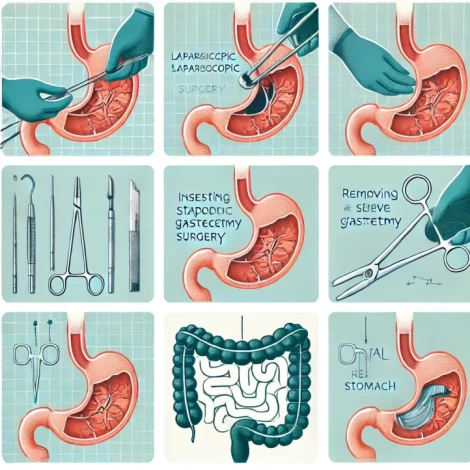Laparoscopic Gastric Sleeve: A Minimally Invasive Solution for Obesity
Weight Loss Surgery
Obesity is a global epidemic with rising prevalence and significant health risks, including diabetes, heart disease, and hypertension. The urgent need for effective weight loss solutions has led many to consider bariatric surgery, particularly laparoscopic gastric sleeve, known for its effectiveness in promoting weight loss and addressing obesity-related conditions.
Laparoscopic sleeve gastrectomy is a minimally invasive procedure that removes a large part of the stomach, creating a smaller "sleeve" that limits food intake, reduces hunger, and enhances fullness. This results in significant weight loss.
This article explores laparoscopic sleeve gastrectomy (LSG), its procedure, benefits, risks, post-operative care, expected outcomes, and the necessary lifestyle changes for long-term success.
What Is a Laparoscopic Sleeve Gastrectomy?
A laparoscopic sleeve gastrectomy, also known as gastric sleeve surgery, is a minimally invasive bariatric procedure that involves removing a large portion of the stomach to create a smaller, sleeve-shaped stomach pouch. During the surgery, the surgeon uses a laparoscope (a thin, flexible tube with a camera attached) to view the inside of the abdomen and perform the procedure through small incisions in the abdomen.
The stomach that is removed is approximately 75-80% of its original size, leaving behind a smaller pouch that can hold less food. This restriction in stomach size helps reduce the amount of food a person can eat, leading to weight loss. Additionally, the surgery involves removing the fundus, a part of the stomach that produces the hunger hormone ghrelin, which can help reduce appetite and promote weight loss.
Laparoscopic sleeve gastrectomy is considered a restrictive weight loss surgery. It limits food intake by reducing the stomach's capacity. Unlike some other bariatric procedures, such as gastric bypass surgery, it does not involve rerouting or bypassing the digestive system.
What Are the Laparoscopic Sleeve Gastrectomy (LSG) Procedure Steps?

Laparoscopic sleeve surgery is a relatively safe and effective method for achieving significant weight loss in obese people. The surgery is performed under general anesthesia to ensure the patient is asleep and pain-free during the procedure.
During the laparoscopic sleeve gastrectomy procedure, the bariatric surgeon makes several small incisions in the abdomen. These incisions allow the surgeon to insert a laparoscope, a small camera that provides a view of the inside of the abdomen, as well as specialized surgical instruments. This minimally invasive approach allows the surgeon to perform the procedure with less trauma to the body compared to traditional open surgery.
Next, the surgeon will carefully dissect the stomach along its length, removing approximately 75-85% of the stomach to create the sleeve-shaped stomach. This significantly reduces the stomach's capacity and produces feelings of fullness with much smaller amounts of food.
The remaining portion of the stomach is then sealed using surgical staples or sutures to create a smaller, tube-like stomach. The staples are designed to be permanent and hold the new stomach shape in place.
How Long Does the LSG Procedure Take?
On average, LGS surgery takes 1-2 hours to complete. However, the actual duration can vary depending on the patient's anatomy, the surgeon's experience, and any potential complications that may arise during the procedure.
How Does Sleeve Gastrectomy Cause Weight Loss?
Laparoscopic sleeve gastrectomy restricts the amount of food that can be consumed and reduces the production of the hunger hormone ghrelin. This can help patients feel full more quickly and for more extended periods. This combination of factors can result in significant weight loss and improved health outcomes for people struggling with obesity.
Who Are the Suitable Candidates for Laparoscopic Gastric Sleeve?
People considering laparoscopic gastric sleeve surgery should consult with a bariatric surgeon who can evaluate their specific situation and determine if they are a suitable candidate for the procedure. Good candidates for this bariatric surgery include obese

people who:
- Have a body mass index (BMI) of 40 or higher;
- Have a BMI of 35-39.9 with obesity-related health conditions;
- Have tried and failed to lose weight through other methods but have not been successful in achieving significant and sustainable weight loss;
- Are committed to making long-term changes to their diet and exercise habits to support the weight loss achieved through the surgery;
- Are in good overall health to undergo the surgical procedure and tolerate the anesthesia;
- Do not have any medical conditions or factors that would make the surgery unsafe or increase the risk of complications.
What Is Laparoscopic Gastric Sleeve Recovery Time Like?
The recovery time for laparoscopic bariatric surgery typically varies depending on individual factors such as age, overall health, and how well the patient follows post-operative instructions. However, most patients can expect to be in the hospital for 1-2 days and then begin a gradual return to normal activities within 2-4 weeks after LSG surgery.
During the first few days post-surgery, patients may experience some discomfort, bloating, and fatigue. Pain medication and proper hydration are usually recommended to manage these symptoms. It is important to follow the surgeon's postoperative instructions, including:
- Stick to a clear liquid diet for the first few days after surgery, then slowly progress to pureed foods and eventually solid foods over the next few weeks;
- Take all prescribed medications as directed by your surgeon, including pain medication and any other necessary medications;
- strenuous activities for at least 4-6 weeks after surgery. Slowly increase your activity level as you feel more comfortable;
- Keep your incision sites clean and dry. You may shower after 48 hours, but do not soak in a bath or go swimming until your doctor gives you the green light;
- Watch for signs of complications, such as persistent nausea, vomiting, or abdominal pain, and contact your surgeon immediately if you experience any of these symptoms;
- Drink plenty of fluids to stay hydrated and prevent constipation, but avoid drinking carbonated beverages or alcohol;
- Chew your food thoroughly and eat slowly to prevent digestive problems and promote proper absorption of nutrients;
- Focus on eating small, frequent meals that are high in protein and low in carbohydrates to support healing and weight loss;
- Make sure to attend all scheduled follow-up appointments with your doctor. These appointments are essential for monitoring your progress and addressing any concerns or complications.
Now, if you want to know more about gastric sleeve recovery, follow this article.
What Are the Benefits of Laparoscopic Gastric Sleeve Surgery?
Laparoscopic sleeve gastrectomy offers several benefits for individuals seeking weight loss and improved health outcomes:
- Lower risk of complications: LSG is considered a safe and effective bariatric procedure with a lower risk of complications compared to other weight loss surgeries such as gastric bypass;
- Less invasive procedure: LSG is performed laparoscopically, which involves making small incisions in the abdomen and using a camera to guide the surgery, resulting in less pain, shorter hospital stays, lower risk of infection, and quicker recovery times;
- Effective weight loss: LSG has been shown to result in significant weight loss, with most patients losing 50-70% of their excess body weight within the first year after surgery;
- Improved metabolic health: LSG can lead to improvements in obesity-related health conditions such as type 2 diabetes, high blood pressure, and high cholesterol;
- Improved cosmetic results: Laparoscopic surgery typically leaves more minor scars compared to open surgery, resulting in improved cosmetic outcomes for patients;
- Enhanced quality of life: Successful weight loss following LSG can lead to increased mobility, improved self-esteem, and better overall quality of life for many patients;
What Are the Risks and Complications Associated with Laparoscopic Gastric Sleeve Surgery?
Laparoscopic gastrectomy for weight loss is a safe and effective procedure; however, like any surgical procedure, it carries certain risks and potential complications. Some of them may include:
- Bleeding: There is a risk of bleeding during or after the surgery, which may require blood transfusions or additional medical intervention;
- Infection: Infections at the incision sites or within the abdominal cavity can occur after surgery. Antibiotics may be prescribed to reduce the risk of infection;
- Leakage: A leak from the staple line or the surgical site can occur, leading to serious complications such as infection, abscess formation, or peritonitis. This is a rare but serious complication that may require further surgical intervention;
- Gastroesophageal Reflux Disease (GERD): Some patients may experience worsening or new-onset GERD symptoms after gastric sleeve surgery. This can include heartburn, regurgitation, or difficulty swallowing;
- Stricture: Narrowing of the stomach opening (stricture) can occur, leading to difficulty eating, nausea, vomiting, and potentially requiring endoscopic dilation to correct;
Dumping Syndrome: Rapid emptying of food from the stomach into the small intestine can cause symptoms such as nausea, sweating, weakness, and diarrhea after eating high-sugar or high-fat foods;
- Gallstones: Rapid weight loss after surgery can increase the risk of developing gallstones, which may require treatment such as medication or surgery;
- Complications from Anesthesia: As with any surgical procedure, there are risks associated with anesthesia, including allergic reactions, respiratory problems, and cardiovascular complications;
- Death: 1 in 1,000 patients undergoing weight loss surgery may experience fatal complications.
Long-term Laparoscopic Sleeve Gastrectomy Complications
Some of the long-term risks that can arise after laparoscopic gastric sleeve surgery include:
- Weight Regain: While gastric sleeve surgery is an effective weight loss procedure, some patients may experience weight regain over time if they do not adhere to dietary and lifestyle recommendations. This can occur due to stretching of the stomach pouch or changes in eating habits;
- Malnutrition: After gastric sleeve surgery, some patients may experience malnutrition due to reduced food intake and absorption. This can lead to deficiencies in essential nutrients such as vitamins and minerals;
- Ulcers: Gastric ulcers can develop in the remaining portion of the stomach or at the surgical site. Ulcers can cause pain, bleeding, and other complications if left untreated
- Hernias: Incisional hernias or internal hernias can occur after gastric sleeve surgery, mainly if there is excessive strain on the abdominal wall or if the surgical site weakens over time
- Psychological Issues: Some patients may experience psychological challenges related to body image, self-esteem, and disordered eating behaviors after weight loss surgery. Counseling and support may be necessary to address these issues.

Laparoscopic Gastric Sleeve in Iran
Laparoscopic Sleeve Gastrectomy (LSG) is becoming increasingly popular in Iran due to the country's high-quality healthcare services and affordable prices. The cost of LSG in Iran is significantly lower than in Western countries, making it an attractive option for medical tourists seeking weight loss surgery.
Iranian hospitals and medical centers offer state-of-the-art equipment and technology, ensuring that patients receive top-notch care and treatment. Additionally, Iranian surgeons are highly skilled and experienced in performing different types of bariatric surgeries, including LSG. Many have received training and education from prestigious medical institutions around the world.
Furthermore, Iran's reputation as a leading destination for medical tourism is growing. The country is known for its warm hospitality and patient-centered approach to healthcare. Medical tourists visiting Iran for weight loss surgery can benefit from comprehensive pre-operative assessments, personalized treatment plans, and post-operative care to ensure a successful recovery.
Laparoscopic Sleeve Gastrectomy Details
Final Word
Laparoscopic Gastric Sleeve is not only a minimally invasive solution for obesity but also a life-changing procedure that offers hope and a fresh start to people struggling with their weight. With its proven success in long-term weight loss and health improvement, this bariatric surgery is a testament to the advancements in medical technology and the dedication of healthcare professionals to provide practical, safe, and sustainable solutions for those affected by obesity. With proper preparation, support, and commitment to lifestyle changes, patients can embrace a healthier future and enjoy the many benefits of a slimmer, more active lifestyle.

No reviews
Your comment